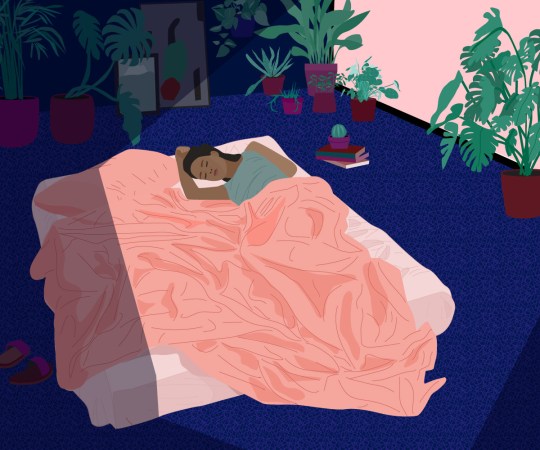We may earn revenue from the products available on this page and participate in affiliate programs.
As consumers, we’ve been taught that the number associated with your bedding thread count is a status symbol. 400-thread count sateen sheets, 500-thread count Pima cotton sheets, 1000-thread count Egyptian cotton—the higher the number, the better the quality, right? No, actually, not at all, says Jeff Chapin, cofounder and chief of product at Casper.
It turns out that thread count, the number of vertical and horizontal threads per square inch, is not an indicator of quality at all. “Thread count is an easy thing to call out on packaging since consumers have been taught to look for this to determine quality,” he says. Unfortunately, though, thread count can be an incredibly deceptive number.
Consumer Reports put bedding to the test and uncovered that a higher thread count doesn’t guarantee better quality sheets. Knowing that a number on a packaging is a quick selling point, many manufacturers will flat out lie about thread count numbers or manipulate strands of fabrics—using thinner strands twisted together as if they were one to increase the count number by double, triple, or even quadruple—to make the thread number more attractive to the consumer. “There is a lot of pseudo-scientific nonsense talked about thread count and bed linen in general, designed solely to get consumers to part with their money,” says Dr. Neil Stanley, a sleep expert who literally wrote the book—How To Sleep—on sleeping well.
Even if that thread count is accurate, the higher number isn’t necessarily more comfortable. Researchers and engineers at Casper Labs, the testing and research lab of Casper, conducted extensive testing around bedding comfort, breathability, and durability and discovered thread count does not directly correlate with comfort. “A higher thread count sounds fancy, but more threads can actually make sheets heavier and less breathable because it locks in air and moisture,” says Chapin.
Instead of simply relying on a thread number, there are many additional elements to consider when it comes to purchasing sheets, such as fabric, weave, and how you sleep. For example, for sleepers who tend to get hot in the middle of the night, certain fabrics and weaves will yield better breathability and durability so you can sleep cool and comfortable at night, says Chapin.
What parameters should you use when buying bedding? Dr. Stanley says thread count should be thrown out the window, and instead it should be purely about aesthetics. “In 37 years of being involved in sleep, I have never heard of someone complaining that they did not sleep because of their uncomfortable bed linen,” he says. “There is no magic thread count. As long as your bed linen is 100 percent natural, the main criteria you should use when buying them is if they look nice.”
If you’re feeling like everything you knew about bedding has been turned upside down, here are three sets of sheets our Domino editors think are both aesthetically pleasing and comfortable.
A favorite of style director Kate Berry, these linens are meant to last a lifetime. They have a lived-in, classically wrinkled look, so it gives an ease to any bedroom. But the comfort! The softness somehow only increases with each wash.
Matouk’s most classic and best-selling bedding is this percale set, with a sleek sateen tape border. No, it is most certainly not cheap, but it’s a favorite of senior home editor, Gabrielle Savoie. She says the quality of the sheets is extraordinary, and they’ve outlasting any other comparable high-end bedding. And it toes the line between feeling crisp yet soft.
This set of sheets was made possible by science. Every element of the bedding, from the weave to the material to the 400 two-ply thread count was analyzed for max comfort. In my personal science experiments at home, I find them to be wonderfully breathable and durable. They’ll also completely refund your money if you don’t love them (up to 100 nights), so that’s pretty rad.
If color is your spice of life, Flaneur sheets have your name written all over them. You can choose from their epically wide variety of shades of hand-dyed sheets, like Jardin- or Van Gogh–inspired colors from their artist series. Or if you’re feeling especially specific, you can color match from a photo or a Pantone code. There isn’t a color option that Flaneur can’t make possible—how incredible is that?
Keep chatting all things bedding: Why You Should Switch to Custom Color Bedding I Never Knew Luxury Until I Slept on These Sheets Can the Right Sheets Help You Fall Asleep?












